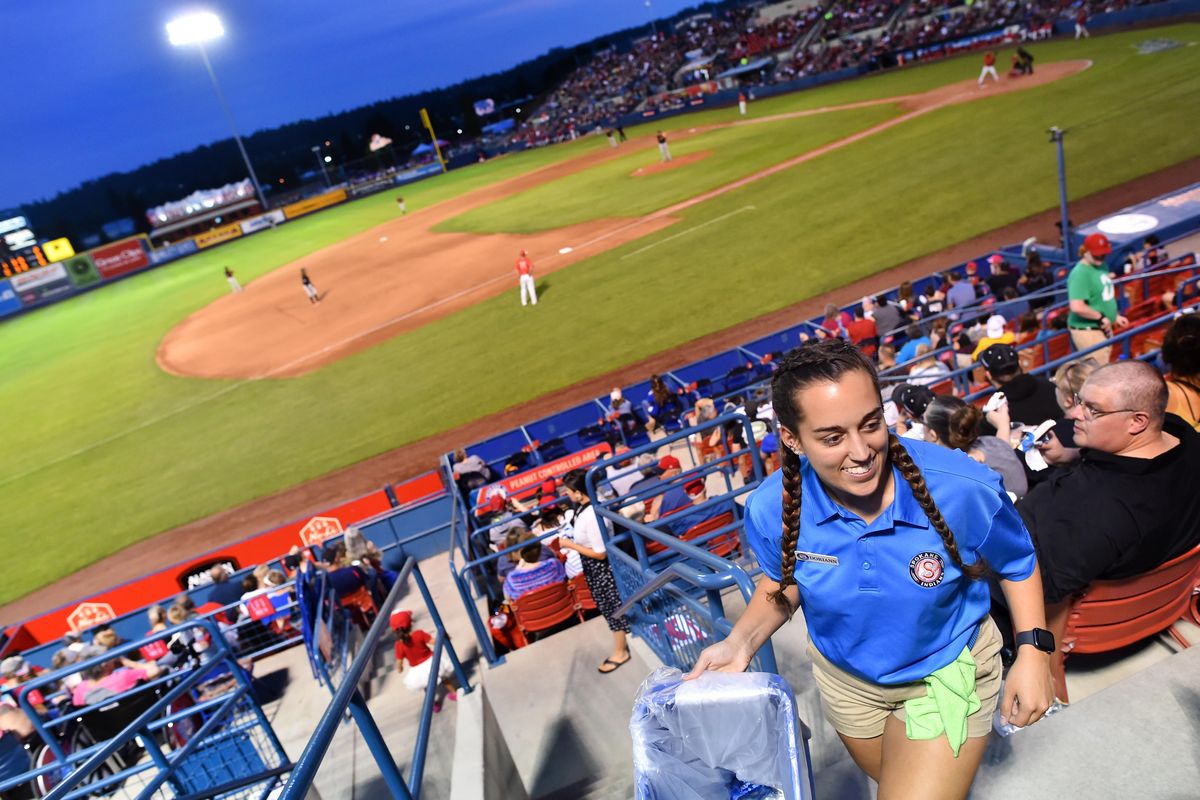‘We’re making big strides’: Spokane Indians work to eliminate waste at Avista Stadium

Behind the right-field stands at Avista Stadium, in an area called Compost Corner, members of the Spokane Indians’ “green team” sifted through bags of compostable items, looking for what didn’t belong.
One particular bag, the contents of which had been emptied onto a wide tray, was mostly pure. A green team member picked out a few items of trash and recycling, then swept the rest into a bin destined for the large container behind him.
All this is part of the Indians’ “Zero Waste By 2022 Campaign,” a goal that senior vice president Otto Klein said the team is well on its way to achieving.
“This year we’ll be at 60 to 70%, which is up from about 15% last year,” Klein said last week, referring to the percentage of all products that end up either composted or recycled at the stadium. “In one year, we’re making big strides.”
The program, which Klein said is among the first of its kind in minor league baseball, follows the lead of a handful of Major League Baseball teams, including the Seattle Mariners. The idea is to reduce waste to 10% or less of all products disposed of at the facility.
Toward that end, Avista Stadium has 60 “Zero Waste Stations” in and around the stadium, with separate bags for compost, recycling and landfill. Above each bag is a picture of what belongs in each, featuring various products from stadium concessions.
Walking along the concourse, Annie Wissmiller, the team’s Zero Waste intern, picked out compostable cups from a recycling bag and moved a crumpled hot dog wrapper from the compost to the trash. When a woman stepped up to read the pictures, Wissmiller directed her to place her empty popcorn bucket in the trash bin.
Wissmiller, who is studying economics and environmental studies at Gonzaga University, spends the first few innings each game doing exactly this, operating under the theory that engaging with fans is the best way to change behaviors.
“It’s a great start. It’s very visual for people, for fans, to see our stations,” Wissmiller said. “The fan engagement has been much higher than my expectations ever were.”
The initiative has collected more than 1,200 bags of compostables, Klein said. Sunshine Disposal & Recycling collects the compostables and then sends them to Barr-Tech in Medical Lake, where they break down into soil. Barr-Tech sells some of it to Wittkopf Landscape Supplies, which then sells the soil right back to the Indians.
Klein said the team plans to use the finished compost in an on-site vegetable garden, where fresh produce can be picked and featured in food at the stadium.
“Closing that loop is really important to our goals,” Klein said.
When the team first established the initiative during the winter, it also instituted “Last Man Sustanding,” a three-strikes-and-you’re-out game that encourages the team’s year-round employees to dispose of items properly in the office.
“If you were caught throwing something away (that was recyclable or compostable), you got a strike,” said Kat O’Melinn, sustainable operations manager for the Indians. “It’s still going, still have a few people alive.”
O’Melinn said the game has trickled down to the baseball game-day staff – some 300 or so people – who are routinely seen stopping at the zero waste stations and sorting misdirected items.
Fans have been receptive to it, Wissmiller said, and the program has made big progress, especially in the first month or so.
“The first few games were definitely awful,” she said. “We really made a lot of progress quickly.”
It is an expensive undertaking, Klein said, but it’s one that fits the character and nature of the organization, which is also committed to rehabilitating baseball fields around the city and protecting redband trout in the Spokane River.
“We’re the community’s baseball team. We feel a responsibility, and we love doing innovative things,” Klein said. “We love being the first and leading the way.”
Not all the stadium receptacles are triple-sort yet, but Klein said that will change at the start of next season. Some products sold at the stadium aren’t compostable, although more are this year than last.
While the progress toward 90% has plateaued, Klein said he’s confident the team can achieve the goal by 2022.
“We’ll definitely get there,” he said. “Next year would be aggressive, but we’re gonna try.”